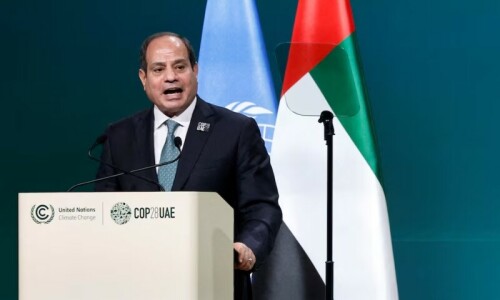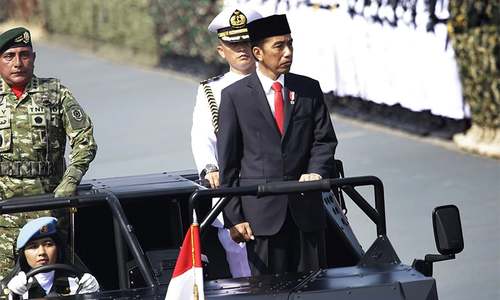HOW a country is organised as a polity casts a long shadow on its economic development. Egypt and Indonesia offer two contrasting examples from recent history.
Both these countries have a broadly similar past in terms of the omnipresent involvement of the military, and both were at a crossroads in their recent history similar to where Pakistan finds itself today. Each, however, took a different path, with vastly different outcomes.
Egypt is a flourishing autocracy with a floundering economy. Indonesia is a functioning democracy while also being economically vibrant. There are important lessons for Pakistan, as it stands at a consequential, and possibly existential, moment in its history.
The Arab Republic of Egypt is a strategically important country in the Middle East, with a population of around 116 million. Though nominally democratic, it has had only a brief and tragic tryst with participatory democracy since its independence in 1922, with long periods of its history marked by army-led one-party, and one-man, rule. Rampant human rights abuses, the denial of the right to vote in free and fair elections or the exercise of free speech and freedom of association, have been the unfortunate hallmarks of this history.
While Egypt is a republic with a de jure semi-presidential form of government, de facto it has been a one-man autocracy for much of its post-independence existence. The military exerts a strong influence in virtually all spheres of Egyptian life, and has a large footprint in the economy. The economy itself is characterised by crony capitalism and the accumulation of rents by connected insiders.
Pakistan is being cast into an Egyptian mould. Indonesia offers a better model.
With a nominal per capita income of around $3,500, Egypt is a lower-middle-income country. Wealth inequality is high, and poverty is widespread. Not unlike Pakistan, Egypt has required multiple bailouts from the IMF, with 12 programmes under its belt. In terms of absolute amount drawn, it currently ranks as the second largest borrower from the Fund.
On top of the protracted use of IMF resources, Egypt has also been the periodic recipient of huge lifelines from its wealthy Gulf backers, notably Saudi Arabia. However, its ruling elite has squandered the loans and external assistance on wasteful expenditures and by siphoning public resources to enrich themselves.
Not surprisingly, Egypt’s governance indicators are poor, similar to Pakistan. Its percentile rank for ‘control of corruption’ is 26th (Pakistan: 22nd), while for ‘voice and accountability’, its percentile rank is ninth (Pakistan: 25th), according to the World Bank’s Worldwide Governance Indicators.
Over the past two years, Pakistan appears to have been heavily inspired by Egypt’s political structure, with the latter’s autocratic one-man system, sham elections, its constitutional court acting as a kangaroo court and as an instrument of state power, an ubiquitous and expanded role for the army, its own version of the Special Investment Facilitation Council or SIFC (called Supreme Council for Investment, first set up in 2016), the stifling of political dissent and widespread human rights abuses.
In addition, political commentators have expressed concern that Pakistan could be taking another leaf from Egypt’s book, and may be moving towards “politicide” of its largest and most popular political party, much like the fate meted out to President Mohamed Morsi and his Freedom and Justice Party, commonly known as the Muslim Brotherhood.
Unlike in Egypt and Pakistan, the military in Indonesia seized the day in 1998 as the Suharto regime collapsed in the face of popular unrest, and took a historic, selfless as well as bold step that has sealed the fate for the better for that country. Instead of consolidating its hold on power, the army leadership at the time decided it was time to head to the barracks.
In the words of Tristan Dreisbach’s case study for Princeton University’s Innovations for Successful Societies, titled Back to the Barracks: Getting the Indonesian Military Out of Politics, 1998-2000: “In May 1998, Indonesia’s armed forces, which had marched in lockstep with the Suharto regime for more than three decades, were poised to begin a stunning about-face. Suharto, a former major general, had resigned when anti-government protests rapidly escalated, and his departure opened the door for a small group of military leaders to implement reforms they had discussed quietly for years.
Agus Widjojo, one of the officers, drafted a plan that would change the relationship between civilian government and the armed forces. His New Paradigm reform agenda called for eliminating the military from many aspects of politics and governance in which it had long played a dominant role. From 1998 to 2000, the military severed its ties with the ruling party, agreed to reduce its representation in the parliament, ordered active-duty officers to leave many posts in civilian government, and separated the police from the armed forces. The changes represented a major break with the past and set the stage for civilian-led reforms to enhance elected government’s control over military institutions and defence policy.“
Since this momentous decision, Indonesia’s economy has taken off and not looked back, with nominal US dollar GDP increasing over 14 times, and per capita income recording a rise of 11 times, between 1998 and 2023. Today, Indonesia attracts over $25 billion in gross FDI inflows (2022), and is the largest economy in Southeast Asia.
For comparison, Egypt’s nominal per capita income in US dollars has increased by a multiple of 2.8, and Pakistan’s 3.3 times over this period.
The military in Egypt has expanded its footprint in all spheres over the past few decades, while the army in Indonesia chose to return to the barracks at a critical moment in the country’s history. The rollback of democratic institutions, impulses as well as aspirations of the citizens, and the entrenchment of autocracy in Egypt has been accompanied by a mostly downward trajectory for the country. The vision of Indonesia’s army leadership, on the other hand, to unilaterally accede to the democratic aspirations of the people, has propelled the country into an economic powerhouse.
The choice for patriotic Pakistanis should be clear.
The writer has been a member of several past economic advisory councils under different prime ministers.
Published in Dawn, October 12th, 2024















































Dear visitor, the comments section is undergoing an overhaul and will return soon.